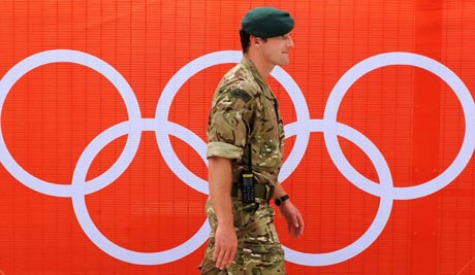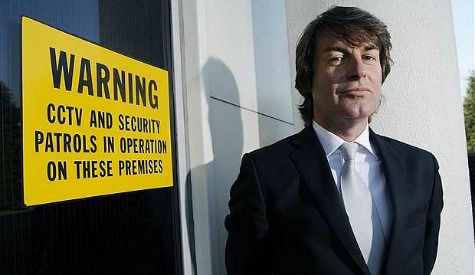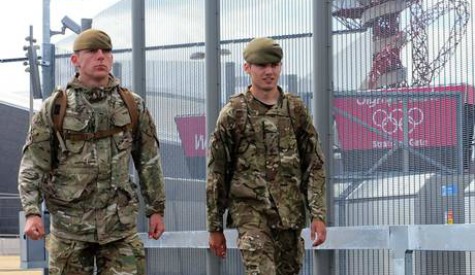l LONDON
 With the Olympics just two weeks away, embarrassing logistical problems about security, staff, phones and traffic made the mood yesterday in London as gloomy as the weather.
With the Olympics just two weeks away, embarrassing logistical problems about security, staff, phones and traffic made the mood yesterday in London as gloomy as the weather.
British lawmakers clamoured for an explanation of why the armed forces need to field 3,500 more troops to protect the games, eclipsing the day that US track star Michael Johnson held the Olympic flame aloft at sunrise at the ancient monument at Stonehenge.
London's ageing infrastructure kept offering up unpleasant surprises as the main road near Heathrow Airport remained closed following emergency repairs. The British mobile phone company O2, meanwhile, acknowledged that thousands of customers had been affected by outages on its network—a bad omen ahead of the first iPhone games.
And then there was the weather. Rain on and off and on again.
London's Hyde Park—the site of outdoor concerts and other live events—has trucked in piles of wood chips to cover a muddy quagmire after the wettest June on record. Someone apparently decided that recreating Woodstock wasn't very Olympic-friendly.
Here's a look at the tsunami of bad news.
BRING ON THE TROOPS
British Home Secretary Theresa May confirmed that the government will deploy an additional 3,500 servicemen at the London Olympics amid concerns that a private security contractor had failed to recruit enough staff. The firm G4S had been enlisted to provide the bulk of the 13,200 private security guards across 100 Olympic venues.
British lawmakers questioned why the apparent gap in security had surfaced so late.
"G4S have let the country down and we have literally had to send in the troops," said opposition Labour Party lawmaker Keith Vaz, demanding to know when the issue was first identified and if G4S—which has millions in contracts from the British government—will suffer any financial penalties.
The move brings the total number of armed forces staff at the games to 17,000, dwarfing the 9,500 troops Britain has in Afghanistan.
The massive Olympic security operation also will feature 12,000 police, 3,000 volunteers, Typhoon fighter jets, helicopters, two warships and bomb disposal experts.
WELCOME TO BRITAIN: THE LINE FORMS HERE
The British media has been full of bad news lately about the queue, that long line at passport control while entering the island nation.
Those lines have been blamed on everything from airline schedules to too much wind, but everyone is looking for a way to bring the wait down. More people than ever used London's Heathrow Airport last year—nearly 70 million passengers– straining its traditional immigration desks.
A report from John Vine, the independent chief inspector of borders and immigration, warned that border staff with only basic training and little immigration experience were being used to cut the length of the queues.
But the Home Office insists help is on the way. Starting this weekend, 500 more people will be manning those desks.
WILL YOU BE ABLE TO GET THERE FROM HERE?
London's ageing transport network continued to befuddle planners who have been working–some for years–to get the city spruced up for the games and for the hundreds of thousands of tourists expected.
The main road linking Heathrow to London and Olympic Park remained closed. The Highways Agency said repairs had reached a critical stage and would continue on a damaged overpass at least until the weekend.
But the big question mark remains as to whether the entire London transport infrastructure can handle the strain. The city's residents are accustomed to overcrowding and delays but tourists may find it shocking, said Tony Travers, a transport expert at the London School of Economics.
"At this point, we're in the lap of the gods," Travers said. "The London infrastructure is always led on a wing and a prayer."
AND THE RAIN IS A PAIN
The gloomy weather has the entire nation wondering if it will ever get sunny for longer than 15 minutes. The Met Office, Britain's national forecaster, has insisted that the wet start to July does not necessarily mean that it will rain during the Olympics, from July 27 to August 12.
"We could have some nice days," Met spokesman Dan Williams said, somewhat hopefully, although stressing it was still too early to offer any Olympic forecasts.
"It's understandable that people might feel gloomy, especially since we have had such a disappointing run this month," he admitted.
SO MUCH FOR THE
IPHONE OLYMPICS
The scariest development for many has been a mobile phone outage.
British mobile phone company O2 restored its 2G and 3G services after a breakdown that hit some customers for as long as 24 hours Wednesday and yesterday.
That's not a good omen for the vast amounts of tweets and photos expected to be sent during what has been dubbed the "Twitter Games." Those responsible for London's fibre optic cables, phone masts and Wi-Fi hotspots are bracing for a tsunami of data.
O2 executives have said previously the company spent 50 million pounds (US$79 million) on Olympic-related projects.
IS IT JUST A BAD HAIR DAY
OR SHOULD LONDON PANIC?
Historians like to note that with any human endeavour, things go wrong. Martin Polley, an Olympic historian at the University of Southampton, recalled that in the 1948 London Games, organisers forgot to get a union flag for the home team to carry into the stadium. Roger Bannister, who later shattered the four-minute mile, broke into a car to get one for the parade.
So is Jacques Rogge, the head of the International Olympic Committee (IOC), worried about the spate of bad news? Absolutely not.
"It's not peculiar for London. We've always had difficulties in the days leading up to the games in the previous games and the games were of an impeccable nature," he said.
Besides, there's still time to sort things out.
"We're confident that everything will be fine by the opening ceremony," Rogge said.
www.trinidadexpress.com
 G4S has revealed tonight that it stands to lose up to £50 million ($78 million/€64 million) after 3,500 military personnel had to be drafted into provide security for London 2012 because the company failed to meet its contractual obligations.
G4S has revealed tonight that it stands to lose up to £50 million ($78 million/€64 million) after 3,500 military personnel had to be drafted into provide security for London 2012 because the company failed to meet its contractual obligations.  "The company is entering the final stages of an extremely complex workforce supply contract which is on an unprecedented scale.
"The company is entering the final stages of an extremely complex workforce supply contract which is on an unprecedented scale. But there is no sympathy for the situation the company finds itself in, especially as some of the military called into have had to cancel leave despite having only recently returned from active duty in Afghanistan.
But there is no sympathy for the situation the company finds itself in, especially as some of the military called into have had to cancel leave despite having only recently returned from active duty in Afghanistan.
 With the Olympics just two weeks away, embarrassing logistical problems about security, staff, phones and traffic made the mood yesterday in London as gloomy as the weather.
With the Olympics just two weeks away, embarrassing logistical problems about security, staff, phones and traffic made the mood yesterday in London as gloomy as the weather. T&T will host a culture fest in London during the 2012 Olympic games. The event will be held at the Tricycle Theatre in Kilburn, London, and will be open to the public one day before the July 27 opening of the Olympics. It will be facilitated by T&T High Commissioner to London Garvin Nicholas. In a phone interview with the T&T Guardian last week, Nicholas said the event was causing a lot of excitement within diplomatic circles. 'For four and a half weeks we will be promoting T&T from 10 am to 11 pm daily, and the venue is only 20 minutes from the Olympic Village by train,” Nicholas said. The festival will include a number of children’s workshops. “We will have elements of eco mas-making, where we will be making costumes from recycled material. There will be workshops on preparation of local foods with a focus on proper nutrition, drumming and a variety of other activities for children,” he said.
T&T will host a culture fest in London during the 2012 Olympic games. The event will be held at the Tricycle Theatre in Kilburn, London, and will be open to the public one day before the July 27 opening of the Olympics. It will be facilitated by T&T High Commissioner to London Garvin Nicholas. In a phone interview with the T&T Guardian last week, Nicholas said the event was causing a lot of excitement within diplomatic circles. 'For four and a half weeks we will be promoting T&T from 10 am to 11 pm daily, and the venue is only 20 minutes from the Olympic Village by train,” Nicholas said. The festival will include a number of children’s workshops. “We will have elements of eco mas-making, where we will be making costumes from recycled material. There will be workshops on preparation of local foods with a focus on proper nutrition, drumming and a variety of other activities for children,” he said.